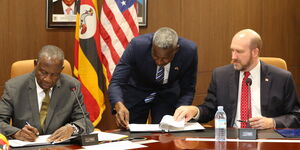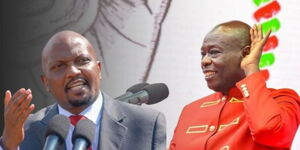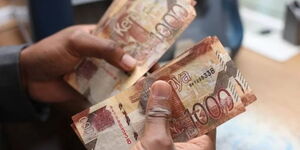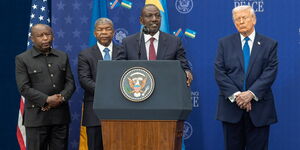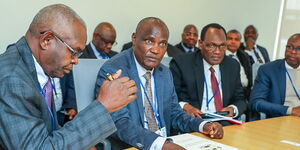President William Ruto (left) speaking with IMF managing director Kristalina Georgieva in Italy on January 29, 2024
PCS
Kenya has announced fresh plans to engage the International Monetary Fund (IMF) on possible new loan programmes to support the economy.
Prime Cabinet Secretary Musalia Mudavadi on Thursday revealed that the National Treasury is preparing to open talks with the lender on fresh areas of financing and economic collaboration.
Speaking during the Quarterly Diplomatic Briefing in Nairobi, Mudavadi said the government is keen on securing a structured programme with the IMF to provide a clear economic pathway.
His remarks come at a time when Kenya’s existing arrangements with the lender have remained inactive for close to a year, with successor programmes yet to be finalised.
Treasury CS John Mbadi, during a meeting with a United States Government Delegation on Global Health Security and Diplomacy at the Treasury building in Nairobi on August 28, 2025.
Photo
Ministry of Treasury
“The government of Kenya, through the Treasury, will be engaging with the IMF so that we can work on a new programme,” Mudavadi confirmed. He noted that discussions would be geared toward identifying financing options that can help stabilise the economy and sustain development priorities.
The Treasury is expected to send an engagement team to initiate formal talks with the IMF, with Mudavadi saying that the decision signals the government’s intent to continue working closely with global financial institutions to secure Kenya’s fiscal position.
Meanwhile, according to analysts, a return to the Washington-based lender would face some hurdles, as the government may be required to repay part of its existing debt before a substantive new financing programme can be considered, with an agreement unlikely to be reached before 2027.
The government is seeking a new loan to facilitate external debt payments, with talks set to begin between the two parties over the next two months.
Kenya had previously agreed on a four-year, $3.6 billion (Ksh465 billion) IMF programme that expired in April but missed out on a final disbursement of about $850 million (Ksh109.9 billion) after struggling to meet key targets, including reducing its budget deficit and increasing tax revenue.
In the midst of the stalemate, Nairobi has been keen on securing alternative sources of funding, including selling diaspora bonds, privatising state assets, and refinancing existing local and foreign bonds to relieve immediate pressure on the state’s finances.
Separately, Mudavadi also disclosed that the government is working to ensure Kenya is removed from the Financial Action Task Force (FATF) grey list on money laundering and terror financing. He said Treasury officials were already engaging with relevant agencies and development partners to meet the compliance benchmarks.
“Equally, we continue to engage with our development partners and other relevant bodies so that we can eliminate Kenya’s listing on the grey list of the FATF,” Mudavadi added, pointing to the government’s resolve to restore international confidence in the country’s financial systems.
In June this year, the European Commission placed Kenya in its updated list of high-risk jurisdictions presenting strategic deficiencies in their national anti-money laundering and countering the financing of terrorism regimes.
The commission said that it had added a number of third-country jurisdictions to its list, including Algeria, Angola, Côte d'Ivoire, Kenya, Laos, Lebanon, Monaco, Namibia, Nepal, and Venezuela.
This meant that Kenya and the affected countries then entered the blacklist of countries subject to extra monitoring of their money laundering controls.
An image showing the entrance of the National Treasury buildings
Photo
National Treasury.


